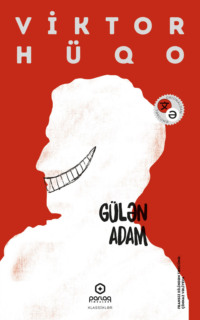
Полная версия
The Man Who Laughs. A Romance of English History
Once nevertheless he raised them towards the sky, and tried to make out the three stars of Orion’s belt. These stars are called the three magi, and an old proverb of the ancient Spanish pilots declares that, “He who sees the three magi is not far from the Saviour.”
This glance of the captain’s tallied with an aside growled out, at the other end of the vessel, by the old man, “We don’t even see the pointers, nor the star Antares, red as he is. Not one is distinct.”
No care troubled the other fugitives.
Still, when the first hilarity they felt in their escape had passed away, they could not help remembering that they were at sea in the month of January, and that the wind was frozen. It was impossible to establish themselves in the cabin. It was much too narrow and too much encumbered by bales and baggage. The baggage belonged to the passengers, the bales to the crew, for the hooker was no pleasure boat, and was engaged in smuggling. The passengers were obliged to settle themselves on deck, a condition to which these wanderers easily resigned themselves. Open-air habits make it simple for vagabonds to arrange themselves for the night. The open air (la belle étoile) is their friend, and the cold helps them to sleep-sometimes to die.
This night, as we have seen, there was no belle étoile.
The Languedocian and the Genoese, while waiting for supper, rolled themselves up near the women, at the foot of the mast, in some tarpaulin which the sailors had thrown them.
The old man remained at the bow motionless, and apparently insensible to the cold.
The captain of the hooker, from the helm where he was standing, uttered a sort of guttural call somewhat like the cry of the American bird called the exclaimer; at his call the chief of the brand drew near, and the captain addressed him thus,-
“Etcheco Jaüna.” These two words, which mean “tiller of the mountain,” form with the old Cantabri a solemn preface to any subject which should command attention.
Then the captain pointed the old man out to the chief, and the dialogue continued in Spanish; it was not, indeed, a very correct dialect, being that of the mountains. Here are the questions and answers.
“Etcheco jaüna, que es este hombre? [3]”
“Un hombre.”
“Que lenguas habla?”
“Todas.”
“Que cosas sabe?”
“Todas.”
“Quai païs?”
“Ningun, y todos.”
“Qual dios?”
“Dios.”
“Como le llamas?”
“El tonto.”
“Como dices que le llamas?”
“El sabio.”
“En vuestre tropa que esta?”
“Esta lo que esta.”
“El gefe?”
“No.”
“Pues que esta?”
“La alma.”
The chief and the captain parted, each reverting to his own meditation, and a little while afterwards the Matutina left the gulf.
Now came the great rolling of the open sea. The ocean in the spaces between the foam was slimy in appearance. The waves, seen through the twilight in indistinct outline, somewhat resembled plashes of gall. Here and there a wave floating flat showed cracks and stars, like a pane of glass broken by stones; in the centre of these stars, in a revolving orifice, trembled a phosphorescence, like that feline reflection, of vanished light which shines in the eyeballs of owls.
Proudly, like a bold swimmer, the Matutina crossed the dangerous Shambles shoal. This bank, a hidden obstruction at the entrance of Portland roads, is not a barrier; it is an amphitheatre-a circus of sand under the sea, its benches cut out by the circling of the waves-an arena, round and symmetrical, as high as a Jungfrau, only drowned-a coliseum of the ocean, seen by the diver in the vision-like transparency which engulfs him, – such is the Shambles shoal. There hydras fight, leviathans meet. There, says the legend, at the bottom of the gigantic shaft, are the wrecks of ships, seized and sunk by the huge spider Kraken, also called the fish-mountain. Such things lie in the fearful shadow of the sea.
These spectral realities, unknown to man, are manifested at the surface by a slight shiver.
In this nineteenth century, the Shambles bank is in ruins; the breakwater recently constructed has overthrown and mutilated, by the force of its surf, that high submarine architecture, just as the jetty, built at the Croisic in 1760, changed, by a quarter of an hour, the course of the tides. And yet the tide is eternal. But eternity obeys man more than man imagines.
Chapter iv
A cloud different from the others
enters on the scene
The old man whom the chief of the band had named first the Madman, then the Sage, now never left the forecastle. Since they crossed the Shambles shoal, his attention had been divided between the heavens and the waters. He looked down, he looked upwards, and above all watched the north-east.
The skipper gave the helm to a sailor, stepped over the after hatchway, crossed the gangway, and went on to the forecastle. He approached the old man, but not in front. He stood a little behind, with elbows resting on his hips, with outstretched hands, the head on one side, with open eyes and arched eyebrows, and a smile in the corners of his mouth-an attitude of curiosity hesitating between mockery and respect.
The old man, either that it was his habit to talk to himself, or that hearing some one behind incited him to speech, began to soliloquize while he looked into space.
“The meridian, from which the right ascension is calculated, is marked in this century by four stars-the Polar, Cassiopeia’s Chair, Andromeda’s Head, and the star Algenib, which is in Pegasus. But there is not one visible.”
These words followed each other mechanically, confused, and scarcely articulated, as if he did not care to pronounce them. They floated out of his mouth and dispersed. Soliloquy is the smoke exhaled by the inmost fires of the soul.
The skipper broke in, “My lord!”
The old man, perhaps rather deaf as well as very thoughtful, went on,-
“Too few stars, and too much wind. The breeze continually changes its direction and blows inshore; thence it rises perpendicularly. This results from the land being warmer than the water. Its atmosphere is lighter. The cold and dense wind of the sea rushes in to replace it. From this cause, in the upper regions the wind blows towards the land from every quarter. It would be advisable to make long tacks between the true and apparent parallel. When the latitude by observation differs from the latitude by dead reckoning by not more than three minutes in thirty miles, or by four minutes in sixty miles, you are in the true course.”
The skipper bowed, but the old man saw him not. The latter, who wore what resembled an Oxford or Gottingen university gown, did not relax his haughty and rigid attitude. He observed the waters as a critic of waves and of men. He studied the billows, but almost as if he was about to demand his turn to speak amidst their turmoil, and teach them something. There was in him both pedagogue and soothsayer. He seemed an oracle of the deep.
He continued his soliloquy, which was perhaps intended to be heard.
“We might strive if we had a wheel instead of a helm. With a speed of twelve miles an hour, a force of twenty pounds exerted on the wheel produces three hundred thousand pounds’ effect on the course. And more too. For in some cases, with a double block and runner, they can get two more revolutions.”
The skipper bowed a second time, and said, “My lord!”
The old man’s eye rested on him; he had turned his head without moving his body.
“Call me Doctor.”
“Master Doctor, I am the skipper.”
“Just so,” said the doctor.
The doctor, as henceforward we shall call him, appeared willing to converse.
“Skipper, have you an English sextant?”
“No.”
“Without an English sextant you cannot take an altitude at all.”
“The Basques,” replied the captain, “took altitudes before there were any English.”
“Be careful you are not taken aback.”
“I keep her away when necessary.”
“Have you tried how many knots she is running?”
“Yes.”
“When?”
“Just now.”
“How?”
“By the log.”
“Did you take the trouble to look at the triangle?”
“Yes.”
“Did the sand run through the glass in exactly thirty seconds?”
“Yes.”
“Are you sure that the sand has not worn the hole between the globes?”
“Yes.”
“Have you proved the sand-glass by the oscillations of a bullet?”
“Suspended by a rope yarn drawn out from the top of a coil of soaked hemp? Undoubtedly.”
“Have you waxed the yarn lest it should stretch?”
“Yes.”
“Have you tested the log?”
“I tested the sand-glass by the bullet, and checked the log by a round shot.”
“Of what size was the shot?”
“One foot in diameter.”
“Heavy enough?”
“It is an old round shot of our war hooker, La Casse de Par-Grand.”
“Which was in the Armada?”
“Yes.”
“And which carried six hundred soldiers, fifty sailors, and twenty-five guns?”
“Shipwreck knows it.”
“How did you compute the resistance of the water to the shot?”
“By means of a German scale.”
“Have you taken into account the resistance of the rope supporting the shot to the waves?”
“Yes.”
“What was the result?”
“The resistance of the water was 170 pounds.”
“That’s to say she is running four French leagues an hour.”
“And three Dutch leagues.”
“But that is the difference merely of the vessel’s way and the rate at which the sea is running?”
“Undoubtedly.”
“Whither are you steering?”
“For a creek I know, between Loyola and St. Sebastian.”
“Make the latitude of the harbour’s mouth as soon as possible.”
“Yes, as near as I can.”
“Beware of gusts and currents. The first cause the second.”
“Traidores [4].”
“No abuse. The sea understands. Insult nothing. Rest satisfied with watching.”
“I have watched, and I do watch. Just now the tide is running against the wind; by-and-by, when it turns, we shall be all right.”
“Have you a chart?”
“No; not for this channel.”
“Then you sail by rule of thumb?”
“Not at all. I have a compass.”
“The compass is one eye, the chart the other.”
“A man with one eye can see.”
“How do you compute the difference between the true and apparent course?”
“I’ve got my standard compass, and I make a guess.”
“To guess is all very well. To know for certain is better.”
“Christopher guessed.”
“When there is a fog and the needle revolves treacherously, you can never tell on which side you should look out for squalls, and the end of it is that you know neither the true nor apparent day’s work. An ass with his chart is better off than a wizard with his oracle.”
“There is no fog in the breeze yet, and I see no cause for alarm.”
“Ships are like flies in the spider’s web of the sea.”
“Just now both winds and waves are tolerably favourable.”
“Black specks quivering on the billows-such are men on the ocean.”
“I dare say there will be nothing wrong to-night.”
“You may get into such a mess that you will find it hard to get out of it.”
“All goes well at present.”
The doctor’s eyes were fixed on the north-east. The skipper continued,-
“Let us once reach the Gulf of Gascony, and I answer for our safety. Ah! I should say I am at home there. I know it well, my Gulf of Gascony. It is a little basin, often very boisterous; but there, I know every sounding in it and the nature of the bottom-mud opposite San Cipriano, shells opposite Cizarque, sand off Cape Peñas, little pebbles off Boncaut de Mimizan, and I know the colour of every pebble.”
The skipper broke off; the doctor was no longer listening.
The doctor gazed at the north-east. Over that icy face passed an extraordinary expression. All the agony of terror possible to a mask of stone was depicted there. From his mouth escaped this word, “Good!”
His eyeballs, which had all at once become quite round like an owl’s, were dilated with stupor on discovering a speck on the horizon. He added,-
“It is well. As for me, I am resigned.”
The skipper looked at him. The doctor went on talking to himself, or to some one in the deep,-
“I say, Yes.”
Then he was silent, opened his eyes wider and wider with renewed attention on that which he was watching, and said,-
“It is coming from afar, but not the less surely will it come.”
The arc of the horizon which occupied the visual rays and thoughts of the doctor, being opposite to the west, was illuminated by the transcendent reflection of twilight, as if it were day. This arc, limited in extent, and surrounded by streaks of grayish vapour, was uniformly blue, but of a leaden rather than cerulean blue. The doctor, having completely returned to the contemplation of the sea, pointed to this atmospheric arc, and said,-
“Skipper, do you see?”
“What?”
“That.”
“What?”
“Out there.”
“A blue spot? Yes.”
“What is it?”
“A niche in heaven.”
“For those who go to heaven; for those who go elsewhere it is another affair.” And he emphasized these enigmatical words with an appalling expression which was unseen in the darkness.
A silence ensued. The skipper, remembering the two names given by the chief to this man, asked himself the question,-
“Is he a madman, or is he a sage?”
The stiff and bony finger of the doctor remained immovably pointing, like a sign-post, to the misty blue spot in the sky.
The skipper looked at this spot.
“In truth,” he growled out, “it is not sky but clouds.”
“A blue cloud is worse than a black cloud,” said the doctor; “and,” he added, “it’s a snow-cloud.”
“La nube de la nieve,” said the skipper, as if trying to understand the word better by translating it.
“Do you know what a snow-cloud is?” asked the doctor.
“No.”
“You’ll know by-and-by.”
The skipper again turned his attention to the horizon.
Continuing to observe the cloud, he muttered between his teeth,-
“One month of squalls, another of wet; January with its gales, February with its rains-that’s all the winter we Asturians get. Our rain even is warm. We’ve no snow but on the mountains. Ay, ay; look out for the avalanche. The avalanche is no respecter of persons. The avalanche is a brute.”
“And the waterspout is a monster,” said the doctor, adding, after a pause, “Here it comes.” He continued, “Several winds are getting up together-a strong wind from the west, and a gentle wind from the east.”
“That last is a deceitful one,” said the skipper.
The blue cloud was growing larger.
“If the snow,” said the doctor, “is appalling when it slips down the mountain, think what it is when it falls from the Pole!”
His eye was glassy. The cloud seemed to spread over his face and simultaneously over the horizon. He continued, in musing tones,-
“Every minute the fatal hour draws nearer. The will of Heaven is about to be manifested.”
The skipper asked himself again this question, – ”Is he a madman?”
“Skipper,” began the doctor, without taking his eyes off the cloud, “have you often crossed the Channel?”
“This is the first time.”
The doctor, who was absorbed by the blue cloud, and who, as a sponge can take up but a definite quantity of water, had but a definite measure of anxiety, displayed no more emotion at this answer of the skipper than was expressed by a slight shrug of his shoulders.
“How is that?”
“Master Doctor, my usual cruise is to Ireland. I sail from Fontarabia to Black Harbour or to the Achill Islands. I go sometimes to Braich-y-Pwll, a point on the Welsh coast. But I always steer outside the Scilly Islands. I do not know this sea at all.”
“That’s serious. Woe to him who is inexperienced on the ocean! One ought to be familiar with the Channel-the Channel is the Sphinx. Look out for shoals.”
“We are in twenty-five fathoms here.”
“We ought to get into fifty-five fathoms to the west, and avoid even twenty fathoms to the east.”
“We’ll sound as we get on.”
“The Channel is not an ordinary sea. The water rises fifty feet with the spring tides, and twenty-five with neap tides. Here we are in slack water. I thought you looked scared.”
“We’ll sound to-night.”
“To sound you must heave to, and that you cannot do.”
“Why not?”
“On account of the wind.”
“We’ll try.”
“The squall is close on us.”
“We’ll sound, Master Doctor.”
“You could not even bring to.”
“Trust in God.”
“Take care what you say. Pronounce not lightly the awful name.”
“I will sound, I tell you.”
“Be sensible; you will have a gale of wind presently.”
“I say that I will try for soundings.”
“The resistance of the water will prevent the lead from sinking, and the line will break. Ah! so this is your first time in these waters?”
“The first time.”
“Very well; in that case listen, skipper.”
The tone of the word “listen” was so commanding that the skipper made an obeisance.
“Master Doctor, I am all attention.”
“Port your helm, and haul up on the starboard tack.”
“What do you mean?”
“Steer your course to the west.”
“Caramba!”
“Steer your course to the west.”
“Impossible.”
“As you will. What I tell you is for the others’ sake. As for myself, I am indifferent.”
“But, Master Doctor, steer west?”
“Yes, skipper.”
“The wind will be dead ahead.”
“Yes, skipper.”
“She’ll pitch like the devil.”
“Moderate your language. Yes, skipper.”
“The vessel would be in irons.”
“Yes, skipper.”
“That means very likely the mast will go.”
“Possibly.”
“Do you wish me to steer west?”
“Yes.”
“I cannot.”
“In that case settle your reckoning with the sea.”
“The wind ought to change.”
“It will not change all night.”
“Why not?”
“Because it is a wind twelve hundred leagues in length.”
“Make headway against such a wind! Impossible.”
“To the west, I tell you.”
“I’ll try, but in spite of everything she will fall off.”
“That’s the danger.”
“The wind sets us to the east.”
“Don’t go to the east.”
“Why not?”
“Skipper, do you know what is for us the word of death?”
“No.”
“Death is the east.”
“I’ll steer west.”
This time the doctor, having turned right round, looked the skipper full in the face, and with his eyes resting on him, as though to implant the idea in his head, pronounced slowly, syllable by syllable, these words,-
“If to-night out at sea we hear the sound of a bell, the ship is lost.”
The skipper pondered in amaze.
“What do you mean?”
The doctor did not answer. His countenance, expressive for a moment, was now reserved. His eyes became vacuous. He did not appear to hear the skipper’s wondering question. He was now attending to his own monologue. His lips let fall, as if mechanically, in a low murmuring tone, these words,-
“The time has come for sullied souls to purify themselves.”
The skipper made that expressive grimace which raises the chin towards the nose.
“He is more madman than sage,” he growled, and moved off.
Nevertheless he steered west.
But the wind and the sea were rising.
Chapter v
Hardquanonne
The mist was deformed by all sorts of inequalities, bulging out at once on every point of the horizon, as if invisible mouths were busy puffing out the bags of wind. The formation of the clouds was becoming ominous. In the west, as in the east, the sky’s depths were now invaded by the blue cloud: it advanced in the teeth of the wind. These contradictions are part of the wind’s vagaries.
The sea, which a moment before wore scales, now wore a skin-such is the nature of that dragon. It was no longer a crocodile: it was a boa. The skin, lead-coloured and dirty, looked thick, and was crossed by heavy wrinkles. Here and there, on its surface, bubbles of surge, like pustules, gathered and then burst. The foam was like a leprosy. It was at this moment that the hooker, still seen from afar by the child, lighted her signal.
A quarter of an hour elapsed.
The skipper looked for the doctor: he was no longer on deck. Directly the skipper had left him, the doctor had stooped his somewhat ungainly form under the hood, and had entered the cabin; there he had sat down near the stove, on a block. He had taken a shagreen ink-bottle and a cordwain pocket-book from his pocket; he had extracted from his pocket-book a parchment folded four times, old, stained, and yellow; he had opened the sheet, taken a pen out of his ink-case, placed the pocket-book flat on his knee, and the parchment on the pocket-book; and by the rays of the lantern, which was lighting the cook, he set to writing on the back of the parchment. The roll of the waves inconvenienced him. He wrote thus for some time.
As he wrote, the doctor remarked the gourd of aguardiente, which the Provençal tasted every time he added a grain of pimento to the puchero, as if he were consulting it in reference to the seasoning. The doctor noticed the gourd, not because it was a bottle of brandy, but because of a name which was plaited in the wickerwork with red rushes on a background of white. There was light enough in the cabin to permit of his reading the name.
The doctor paused, and spelled it in a low voice,-
“Hardquanonne.”
Then he addressed the cook.
“I had not observed that gourd before; did it belong to Hardquanonne?”
“Yes,” the cook answered; “to our poor comrade, Hardquanonne.”
The doctor went on,-
“To Hardquanonne, the Fleming of Flanders?”
“Yes.”
“Who is in prison?”
“Yes.”
“In the dungeon at Chatham?”
“It is his gourd,” replied the cook; “and he was my friend. I keep it in remembrance of him. When shall we see him again? It is the bottle he used to wear slung over his hip.”
The doctor took up his pen again, and continued laboriously tracing somewhat straggling lines on the parchment. He was evidently anxious that his handwriting should be very legible; and at length, notwithstanding the tremulousness of the vessel and the tremulousness of age, he finished what he wanted to write.
It was time, for suddenly a sea struck the craft, a mighty rush of waters besieged the hooker, and they felt her break into that fearful dance in which ships lead off with the tempest.
The doctor arose and approached the stove, meeting the ship’s motion with his knees dexterously bent, dried as best he could, at the stove where the pot was boiling, the lines he had written, refolded the parchment in the pocket-book, and replaced the pocket-book and the inkhorn in his pocket.
The stove was not the least ingenious piece of interior economy in the hooker. It was judiciously isolated. Meanwhile the pot heaved-the Provençal was watching it.
“Fish broth,” said he.
“For the fishes,” replied the doctor. Then he went on deck again.
Chapter vi
They think that help is at hand
Through his growing preoccupation the doctor in some sort reviewed the situation; and any one near to him might have heard these words drop from his lips,-
“Too much rolling, and not enough pitching.”
Then recalled to himself by the dark workings of his mind, he sank again into thought, as a miner into his shaft. His meditation in nowise interfered with his watch on the sea. The contemplation of the sea is in itself a reverie.
The dark punishment of the waters, eternally tortured, was commencing. A lamentation arose from the whole main. Preparations, confused and melancholy, were forming in space. The doctor observed all before him, and lost no detail. There was, however, no sign of scrutiny in his face. One does not scrutinize hell.
A vast commotion, yet half latent, but visible through the turmoils in space, increased and irritated, more and more, the winds, the vapours, the waves. Nothing is so logical and nothing appears so absurd as the ocean. Self-dispersion is the essence of its sovereignty, and is one of the elements of its redundance. The sea is ever for and against. It knots that it may unravel itself; one of its slopes attacks, the other relieves. No apparition is so wonderful as the waves. Who can paint the alternating hollows and promontories, the valleys, the melting bosoms, the sketches? How render the thickets of foam, blendings of mountains and dreams? The indescribable is everywhere there-in the rending, in the frowning, in the anxiety, in the perpetual contradiction, in the chiaroscuro, in the pendants of the cloud, in the keys of the ever-open vault, in the disaggregation without rupture, in the funereal tumult caused by all that madness!














